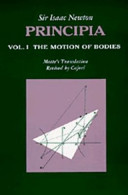Newton's Definitions
Def. I.
The Quantity of Matter is the measure of the same, arising from its density and bulk conjunctly.
THUS AIR of a double density, in a double space, is quadruple in quantity; in a triple space, sextuple in quantity. The same thing is to be understood of snow, and fine dust or powders, that are condensed by compression or liquefaction; and of all bodies that are by any causes whatever differently condensed. I have no regard in this place to a medium, if any such there is, that freely pervades the interstices between the parts of bodies. It is this quantity that I mean hereafter everywhere under the name of Body or Mass. And the same is known by the weight of each body, for it is proportional to the weight, as I have found by experiments on pendulums, very accurately made, which shall be shewn hereafter.
Definition II.
The Quantity of Motion is the measure of the same, arising from the velocity and quantity of matter conjuctly.
The motion of the whole is the Sum of the motions of all the parts; and therefore in a body double in quantity, with equal velocity, the motion is double; with twice the velocity, it is quadruple.
Definition III.
The Vis Insita, or Innate Force of Matter, is a power of resisting, by which every body, as much as in it lies, endeavours to persevere in its present state, whether it be of rest, or of moving uniformly forwards in a right line.
This force is ever proportional to the body whose force it is; and differs nothing from the inactivity of the Mass, but in our manner of conceiving it. A body, from the inactivity of matter, is not without difficulty put out of its state of rest or motion. Upon which account, this Vis insita may, by a most significant name, be called Vis inertiæ or Force of Inactivity. But a body exerts this force only, when another force, impress'd upon it, endeavours to change its condition; and the exercise of this force may be considered both as resistance and impulse; it is resistance in so far as the body, for maintaining its present state withstands the force impressed; it is impulse in so far as the body, by not easily giving way to the impress'd force of another, endeavours to change the state of that other. Resistance is usually ascrib'd to bodies at rest, and impulse to those in motion: But motion and rest, as commonly conceived, are only relatively distinguished; nor are those bodies always truly at rest, which commonly are taken to be so.
Definition IV.
An impress'd force is an action exerted upon a body, in order to change its state, either of rest, or of moving uniformly forward in a right line.
This force consists in the action only; and remains no longer in the body, when the action is over. For a body maintains every new state it acquires, by its Vis Inertiæ only. Impress'd forces are of different origines; as from percussion, from pressure, from centripetal force.
Notes:
Hints of conservation of mass and velocity.
Taxonomies:
/technology and computing/mp3 and midi (0.509266)
/business and industrial/company/merger and acquisition (0.490229)
/society (0.453345)
Keywords:
body (0.973480 (positive:0.064047)), quantity (0.781173 (negative:-0.280257)), vis insita (0.753239 (neutral:0.000000)), vis inertiæ (0.743221 (neutral:0.000000)), right line (0.722472 (positive:0.550946)), present state (0.696239 (positive:0.517258)), force (0.675987 (positive:0.254032)), rest (0.651650 (negative:-0.160130)), motion (0.619048 (negative:-0.414666)), Definitions Hints (0.595967 (neutral:0.000000)), matter (0.591365 (negative:-0.275142)), equal velocity (0.584355 (neutral:0.000000)), fine dust (0.581504 (positive:0.283313)), triple space (0.574373 (neutral:0.000000)), bodies (0.568965 (negative:-0.292524)), Innate Force (0.568819 (neutral:0.000000)), double density (0.565876 (neutral:0.000000)), body exerts (0.564328 (neutral:0.000000)), different origines (0.561403 (positive:0.201620)), double space (0.561361 (neutral:0.000000)), centripetal force (0.553828 (neutral:0.000000)), new state (0.550134 (positive:0.316482)), inactivity (0.539280 (negative:-0.275734)), mass (0.527719 (negative:-0.278292)), resistance (0.510144 (positive:0.489471)), impress (0.494967 (positive:0.277175)), action (0.490666 (positive:0.256807)), measure (0.481676 (neutral:0.000000)), parts (0.476463 (negative:-0.366561)), impulse (0.475858 (positive:0.475383))
Entities:
Force of Inactivity:Organization (0.896672 (neutral:0.000000)), Newton:Person (0.436870 (neutral:0.000000))
Concepts:
Mass (0.976005): dbpedia | freebase | opencyc
Physics (0.581331): dbpedia | freebase | opencyc
Force (0.578480): dbpedia | freebase | opencyc
Classical mechanics (0.573587): dbpedia | freebase
Space (0.404202): dbpedia | freebase
Condensed matter physics (0.390319): dbpedia | freebase | opencyc | yago
Motion (0.386524): dbpedia
Kinematics (0.383165): dbpedia | freebase






